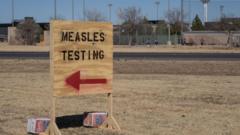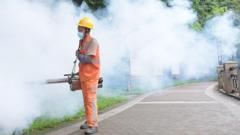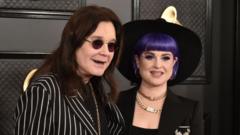The state of Texas is experiencing a significant measles outbreak, with over 480 reported cases, leading to the deaths of two unvaccinated children. Health officials are urging vaccination as a primary means of prevention, while criticisms rise regarding the response to the outbreak.
Texas Measles Outbreak Claims Second Child's Life

Texas Measles Outbreak Claims Second Child's Life
A resurgence of measles in Texas has resulted in the tragic death of a second unvaccinated child amid a growing outbreak.
The US had declared measles eliminated by the year 2000, but this year's epidemic in Texas has raised alarm as cases continue to soar. The latest victim, an eight-year-old girl who was unvaccinated and had no prior health issues, succumbed to complications from the virus, marking the second measles-related death in the state this year. Reports indicate that Texas has surpassed 480 cases of measles as of last week, a noticeable increase from 420 reported earlier. This alarming trend extends beyond Texas, with over 600 cases nationwide, double the figures reported in 2022.
Health authorities have attributed this outbreak primarily to unvaccinated individuals, emphasizing the critical need to increase vaccination rates, especially in communities resistant to vaccines. UMC Health System's Aaron Davis underscored the risks posed by measles, stating, "This unfortunate event underscores the importance of vaccination... Measles is a highly contagious disease that can lead to serious complications, particularly for those who are unvaccinated."
The approaching public health crisis has prompted US Health Secretary Robert F. Kennedy Jr. to visit affected areas to offer condolences and coordinate resources for vaccination and support. Kennedy, who faced backlash for his previous minimal response to the outbreak, acknowledged the depth of the crisis after the deaths. He affirmed the necessity of the measles, mumps, and rubella (MMR) vaccine in preventing further infections.
Prior to this outbreak, the first recorded measles death since 2010 occurred in February among an unvaccinated six-year-old girl from a local religious community. Calls for intensified vaccination efforts have arisen, with local health officials expressing challenges in persuading populations opposed to immunization. Kennedy's comments on the outbreak have ignited scrutiny, especially following his past hesitance to encourage vaccination proactively.
In response to ongoing fatalities, Senator Bill Cassidy has openly declared the need for clearer, stronger messaging around vaccination, stating emphatically, "Everyone should be vaccinated! There is no treatment for measles." The recent outbreak's origins lie within a community that traditionally rejects vaccinations, complicating health officials' efforts to combat the virus's spread.
Experts reiterate that achieving herd immunity — a protective barrier that limits disease transmission among vaccinated individuals — requires about 95% of the population to be vaccinated. Texas health officials' efforts to rectify vaccination hesitancy remain sluggish, underlining the pressing need for strategic public health interventions amidst this resurgence of a once-eliminated disease.
Health authorities have attributed this outbreak primarily to unvaccinated individuals, emphasizing the critical need to increase vaccination rates, especially in communities resistant to vaccines. UMC Health System's Aaron Davis underscored the risks posed by measles, stating, "This unfortunate event underscores the importance of vaccination... Measles is a highly contagious disease that can lead to serious complications, particularly for those who are unvaccinated."
The approaching public health crisis has prompted US Health Secretary Robert F. Kennedy Jr. to visit affected areas to offer condolences and coordinate resources for vaccination and support. Kennedy, who faced backlash for his previous minimal response to the outbreak, acknowledged the depth of the crisis after the deaths. He affirmed the necessity of the measles, mumps, and rubella (MMR) vaccine in preventing further infections.
Prior to this outbreak, the first recorded measles death since 2010 occurred in February among an unvaccinated six-year-old girl from a local religious community. Calls for intensified vaccination efforts have arisen, with local health officials expressing challenges in persuading populations opposed to immunization. Kennedy's comments on the outbreak have ignited scrutiny, especially following his past hesitance to encourage vaccination proactively.
In response to ongoing fatalities, Senator Bill Cassidy has openly declared the need for clearer, stronger messaging around vaccination, stating emphatically, "Everyone should be vaccinated! There is no treatment for measles." The recent outbreak's origins lie within a community that traditionally rejects vaccinations, complicating health officials' efforts to combat the virus's spread.
Experts reiterate that achieving herd immunity — a protective barrier that limits disease transmission among vaccinated individuals — requires about 95% of the population to be vaccinated. Texas health officials' efforts to rectify vaccination hesitancy remain sluggish, underlining the pressing need for strategic public health interventions amidst this resurgence of a once-eliminated disease.



















